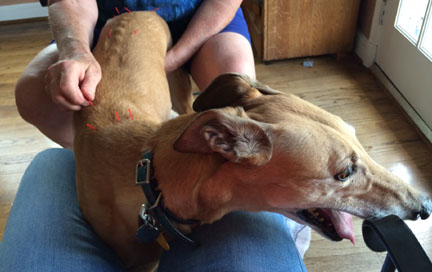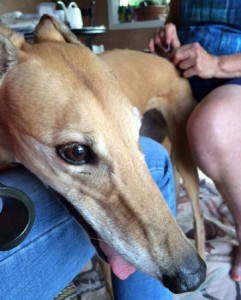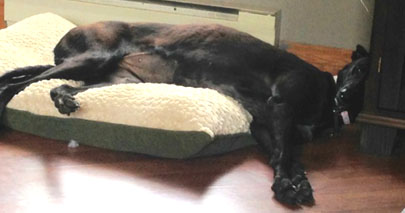A decade ago acupuncture for your dog may have seemed pretty extreme, but today more and more dog owners are finding acupuncture an effective treatment for pain, mobility, and other issues in our furry children.
It’s no longer considered “alternative medicine,” but acupuncture can still seem a bit strange. After all, needles aren’t usually looked upon favorably by most people. Yet acupuncture has many uses and should be considered a viable tool for healing what might be ailing our pups.
Here at SHUG we have seen firsthand the benefits of acupuncture, and we hope you will consider it if your dog is in pain. To provide you more information, we asked Dr. Francie Dougherty, a veterinary acupuncturist in Montgomery County, Md., to answer a few questions.
Q. What is acupuncture?
A. Simply stated, it’s the insertion of very fine needles into specific points on the body. These points are particularly rich in blood flow and nerves, and parts of the lymph system. The needle stimulates the nerve fibers to release neurochemicals that travel throughout the central nervous center. A cascade of feedback mechanisms in the body then brings the release of endorphins -- the body’s natural painkillers -- as well as increased circulation of blood and lymph. It works the same way in humans, and in cats, dogs and horses. The beneficial effects of acupuncture extend well beyond the needle insertion sites.
A. One of the most frequently used applications is to help relieve muscle spasms and alleviate localized pain. The pain can be caused by a variety of things -- trauma, surgery, arthritis. The relief of pain is often very rapid and fairly obvious right away as the patient (your pup, in this scenario) becomes more relaxed and frequently walks away from the treatment with a much more normal gait than it arrived with.
Less obvious are the effects on the circulatory, metabolic and hormonal systems. In dogs, cats and horses, it’s most commonly used for any musculoskeletal problems, skin problems, nervous disorders, reproductive disorders, respiratory problems, poor immunity and internal medicine problems such as cardiac and renal disease. It is well documented to affect all major bodily systems. It’s important to note that animals don’t respond to a placebo affect (as humans can). So when you see an animal respond well to acupuncture, you know it’s real.
Q. How does acupuncture work in conjunction with conventional medicine or treatments?
A. Acupuncture can be used to bridge the gap between medicine and surgery. For instance, your dog can have an orthopedic procedure and you can have acupuncture done to decrease surgical pain and increase speed of healing of skin and tissue around the surgical scar. It can also help the animal be more relaxed with the confinement after surgery, as well as to detox from anesthetics.
Acupuncture can also be used in addition to medications for animals with allergies. The immune system gets more normalized, which can actually increase the threshold for allergens and decrease the need for anti-inflammatory drugs.
 Q. Since needles usually hurt, is there pain associated with acupuncture?
Q. Since needles usually hurt, is there pain associated with acupuncture?
A. Generally, no. The needles in acupuncture are very slender. They have nothing in common with a hypodermic needle, which is larger, thicker and built to transmit fluid. Acupuncture needles actually slide between cells -- they don’t puncture cells.
Q. How do you find a veterinarian acupuncturist?
A. In an ideal situation, your regular veterinary practice has an acupuncturist on staff so that the acupuncture is fully integrated into the dog’s care. But your vet can also consult with an independent acupuncturist, such as one in a holistic veterinary practice. Your dog’s acupuncturists should be a vet -- not a human acupuncturist. You can look for one here, although not all credentialed vet acupuncturists are listed here.
Thanks to Dr. Dougherty for this information.



